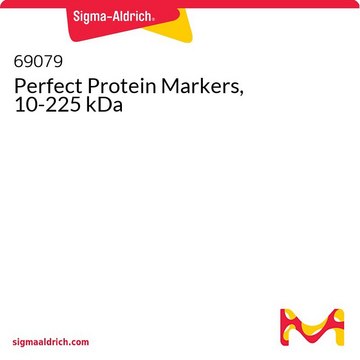MWND500
Kit for Molecular Weights 14,000-500,000 Non-denaturing
Synonyme(s) :
protein markers, protein molecular weight standards, protein standards
About This Item
Produits recommandés
Application
Conditionnement
Proteins:
α-Lactalbumin from bovine milk
Carbonic Anhydrase from bovine erythrocytes
Albumin from chicken egg white
Albumin from bovine serum
Urease from Jack bean
Reconstitution
Produit(s) apparenté(s)
Mention d'avertissement
Danger
Mentions de danger
Conseils de prudence
Classification des risques
Eye Irrit. 2 - Resp. Sens. 1 - Skin Irrit. 2 - STOT SE 3
Organes cibles
Respiratory system
Code de la classe de stockage
10 - Combustible liquids
Classe de danger pour l'eau (WGK)
WGK 3
Point d'éclair (°F)
Not applicable
Point d'éclair (°C)
Not applicable
Faites votre choix parmi les versions les plus récentes :
Déjà en possession de ce produit ?
Retrouvez la documentation relative aux produits que vous avez récemment achetés dans la Bibliothèque de documents.
Les clients ont également consulté
Protocoles
Separation of Polyacrylic acid (PAA) 438 kDa; Polyacrylic acid (PAA) 235 kDa; Polyethylenimine (PEI) 266 kDa ; Poly(dimethyl diallyl ammonium chloride) (PIDADMACl) 204 kDa; p-Aminosalicylic acid (PAS) 7800 Da; p-Aminosalicylic acid (PAS) 257 kDa; Cationic dextran (11 kDa); Chitosan (13.4 kDa)
Notre équipe de scientifiques dispose d'une expérience dans tous les secteurs de la recherche, notamment en sciences de la vie, science des matériaux, synthèse chimique, chromatographie, analyse et dans de nombreux autres domaines..
Contacter notre Service technique










